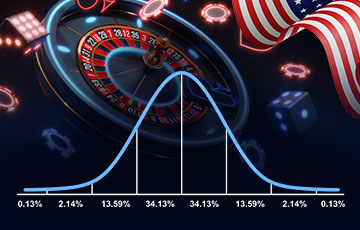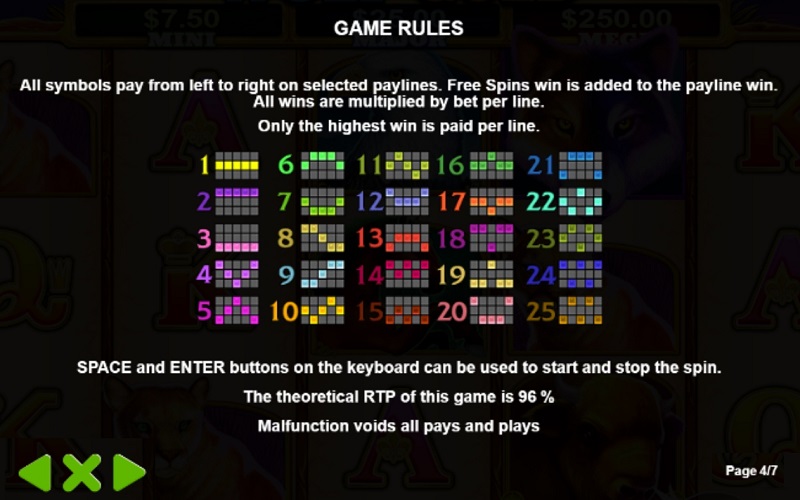Probability in Gambling

Whether you are playing at gambling sites in the USA or prefer to nip into land-based venues, understanding probability in gambling is essential if you want to make smart, educated choices and walk away with a top prize. Understanding probability isn’t something most of us can just sit down and understand off the bat. It takes time and patience to learn how things work. We can’t pretend to teach you everything about a subject that entire books have been devoted to here. However, we can cover the basics and help you get a foothold in the world of probability. Let’s begin.
Probability Theory Mathematics Basics
Before we can discuss gambling probability for USA players here, we need to explore what probability is. More specifically, we need to cover probability theory. This is a branch of mathematics devoted to the understanding of probability.
Probability is the extent that something will or will not happen, or that an event will occur, most often expressed as a ratio or percentage.
Probability theory and gambling go way back. In fact, its roots originate in the 1500s, when Gerolamo Cardano first attempted to analyze games of chance. He was followed by Blaise Pascal a century later, who famously developed the roulette wheel in a bid to study probability theory. Today’s theory of probability is built upon their work, alongside that of Christiaan Huygens, Pierre de Fermat, and Andrey Nikolaevich Kolmogorov, amongst others.
Probability Model in Gambling
The basic notion behind probability is that you are trying to ascertain the likelihood of an event happening (or not happening). You can’t usually do this off the top of your head. However, it is easier the fewer possible outcomes there are to said event. The more outcomes and possibilities there are, the more difficult it is to gauge how probable something is to happen.
To help with this, there are ways to calculate probability and, in the case of online gambling, how likely you are to get a return.
How to Calculate Probability & Expected Return in Gambling
You can’t calculate probability unless you know some of the variables in the equation. For instance, you need to know how many possible outcomes there are. On top of that, you need to know how many of those are desirable outcomes. In the case of gambling, these are winning outcomes.
For instance, we know that when we flip a two-sided coin, there are two possible outcomes, no more. One side is heads, and one side is tails. From this, we can use a probability formula to work out our chances. That formula is like so:
Total number of outcomes / number of winning outcomes = probability
If we were to take our coin, we know that there are two possible outcomes, and only one of those is going to be a winner for us. Therefore, 1/1 = 1. Probability can be expressed as different expressions, namely ratios, percentages, or decimals. Our probability of landing a win on a two-sided coin flip can, therefore, be shown as 1:2, 50% or 0.500, respectively.
Your expected return is the net profit you make if your bet is successful. It is formulated by calculating the amount you win once you subtract your bet from the equation. For instance, the formula looks like this:
The amount you can win – the amount wagered = expected return
To calculate the amount you can win, you need to know what prize/odds you’ll be paid for a successful bet. The general rule is, the less likely something is to occur the greater the odds that will be paid out by the casino. In other words, highly probable outcomes don’t have great returns.
Example
The example above is so easy that you can calculate this probability without the formula. Let’s try something more complicated next.
If we were to roll a six-sided die, we can all agree that there are six possible outcomes (1, 2, 3, 4, 5, 6), and only one of those is going to be a winner for you. Let’s say that you bet on the roll of the die, and you’re hoping for number two. Using our probability theory formula, we can input that information like so:
Total number of outcomes (6) / number of winning outcomes (1) = probability (1 in 6)
When you showcase this statistic as a probability expression, it will look like so:
- Probability of landing number 2 expressed as a ratio: 1:6
- Probability of landing number 2 expressed as a percentage: 16.7%
- Probability of landing number 2 expressed as a decimal: 0.167
Casino Chances, Odds & House Edge Explained
The casino has an advantage over the player in every game – they set the rules, after all. They also have a house edge. This is the amount of money the casino makes in pure profit from every bet you make. The remaining sum is known as the RTP (return to player) rate. This is the amount winnable (amongst all players over all time). Imagine a giant theoretical pot full of cash, and that is sort of like what the RTP represents. Generally speaking, the higher the RTP (and, naturally, the lower the house edge happens to be), the fairer and more desirable the game is for you.
| Casino Game | Average House Edge | Ideal RTP for Players |
|---|---|---|
| Slots | 2-6% | 95% and up |
| Baccarat | 1.06-1.24% | 98.75% and up |
| Blackjack | 0.5-2% | 98% and up |
| Roulette | 1.35-5.26% | 97.5% and up |
| Video Poker | 0.5-5% | 98% and up |
Understanding probability in gambling is fine, but you also need to know about odds, house edges and RTP if you are going to be successful. Once you know the probability of an event occurring and the house edge, you can start to look at the odds attached to it.
This will determine whether a game and/or bet is attractive.

The odds are the prizes the casino pays based on the outcome of your bet. As touched on, highly probable events tend to have low (short) odds, while outcomes that have low probability will generally come with high (long) odds. The higher the odds, the bigger your prize, although the less likely you will be to land it.
Probabilities for Casino Gambling Games
Some casino games are difficult to guess the probability for – like online slots. Others are straightforward, like poker. Let’s walk you through the basics below.
Card Games
You can calculate the probability of landing a specific hand in card games rather simply. First, you need to know how many potential hand combinations there are (based on the number of decks in the shoe). Divide that figure by the number of possible ways you can land a specific hand to get your probability.
Blackjack
You can use the same formula listed for card games to work out the probability in blackjack. You need to know how many decks are in play to determine how many winning combos there are. In a 52-card deck, we know that there are 1,326 possible two hands. There are also four aces and 16 ten-point cards. This means that there are 64 (4 x 16) possible blackjack combos in a game. When we use our probability calculator (64/1326), we can see that there is a 0.048 (4.8%) chance of landing blackjack in the first hand.
Poker
Now let’s look at poker and the hand everybody wants – the Royal Flush. Divide that figure by the number of possible ways you can land a specific hand. In the case of a Royal Flush in a single-deck game, there are 2,598,960 possible hands and just 4 royal flushes, giving us a probability of 4:2,598,960 of landing a Royal Flush. Since there are four, you can divide this further into 1 in every 649,739 hands.
Roulette Wheel
In roulette, the gambling probability for USA users depends on the game they play. American Roulette has a double zero, so that complicates matters. To work out the probability of roulette, you need to take the number of possible combinations you can win with and divide those by the number of pockets on the wheel. For instance, with a straight-up bet in American Roulette, we’re looking to land one number out of 38 (36 numbers and two zero pockets). In short, 1/38 = 0.0263, or 2.63%. Because there is only one zero (1/37) the probability is raised to 0.0270 (or 2.70%) in European Roulette.
Slot Machines
The biggest problem with calculating probability in even the best online slots is that there are thousands, hundreds of thousands of possible combos, and we’ll never be able to count them all to get the figures needed for our equation. However, we can use a similar equation to calculate RTP. To do this, we need to divide the total amount won by the amount wagered. This has to be done on hundreds, even thousands of spins to get an accurate reflection, though. Most slots have RTP rates which hover at around 95% or higher.
Correctness of Betting System Work
You may often hear people say that betting systems are the way to go. We disagree. Firstly, betting symbols have nothing to do with probability in gambling. They are designed to help you break even (with a small profit) when you win. For instance, the Martingale requires you to double your initial bet after a loss and lower it when you win.
The basic idea is that by the time you win (by doubling your bet every time), you will win back what you’ve lost.
It’s a sound idea, save for a major drawback – losing streaks. Unless you’ve got an immense balance, you run the risk of bankrupting before you land that win. This and other betting systems are risky and don’t guarantee success. Moreover, they require you to stick strictly to betting patterns and have little to nothing to do with probability.
Why Casinos Always Win
The casino will always turn a profit, even if you land a win. How? There are good reasons for that, and they include the following:
- The casino’s edge sees them making money, whether you win or lose.
- Casinos create the rules, so they develop them marginally in their favor.
- Probability mathematicians are involved in the development of casino games. In short, casinos don’t offer games that favor the player.
- Many players are lured by side bets and their attractive prizes. These have a woeful probability.
- Casinos may (but not always) adjust the RTP and volatility in slots to ensure that they are making money.


